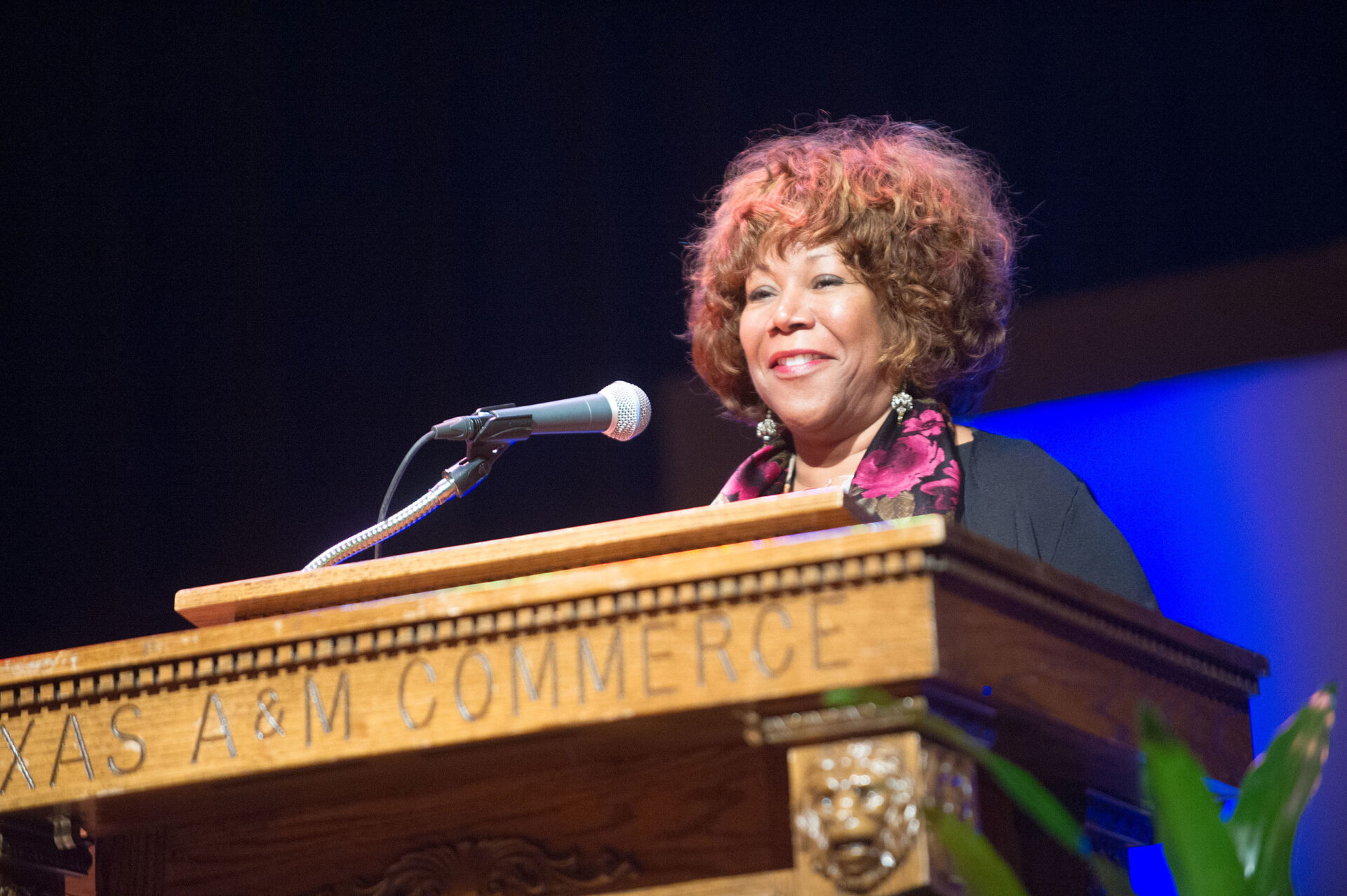
Ruby Bridges speaking at Texas A&M University-Commerce’s Mayo Speaker Series, 2015.
Photograph by Texas A&M University-Commerce Marketing Communications Photography via Flickr
Evil is winning
March 5, 2024
I honestly didn’t know what to expect when I sat down to hear the Ruby Bridges. Can I be a little more honest? Sometimes, keynote speeches aren’t memorable—especially when centered around celebrations that have grown to feel more performative than purposeful, more routine than revolutionary. And yet there I was on a Wednesday night seated amongst over 2,000 others all eager to hear what Ms. Bridges had to say.
My introduction to Ruby Bridges came through my mother, a devoted elementary school teacher who also homeschooled my brother and me for a year when we were preparing to move back to the East Coast. At the time, we were living in Santa Fe, New Mexico, and were the only Black kids in our school, a private Christian academy. Back then, Disney used to make movies that were actually about something, like “The Color of Friendship” (apartheid in South Africa); “Remember the Titans” (racism and integration as told through a Virginia football team) and “The Ernest Green Story” (The Little Rock Nine). My mom’s curriculum also included showing us “Eyes on The Prize,” the PBS series that chronicles the Civil Rights Movement.
I was seven when Disney’s made-for-TV biopic, “Ruby Bridges,” came out. First grade meant that I’d learned about racism but hadn’t quite experienced it firsthand—yet. That’d have to wait until third grade, when we moved to Raleigh, North Carolina. Ruby, who was six when she integrated an all-white elementary school in New Orleans, Louisiana, felt like she could’ve been my friend. A bright little girl who just wanted to learn and have friends. I never thought I’d get to see her beyond the TV screen in my own life. That all changed this year.
There are moments when you realize that a person has given their yes to God. Sitting before us, the now 69-year-old Ruby Bridges named what we cannot forget about, particularly as Christians: the ongoing war between good and evil. It is evil, Ms. Bridges said, that is winning. Evil takes a keen interest in each of us—and so does good. Her words echoed those of Rev. Dr. Martin Luther King Jr., who spoke of the internal good vs. evil war waging within each of us in his sermon, “Unfulfilled Dreams.” Both good and evil, she told us, are seeking someone to use, someone to work through, as conduits and vessels. Evil does not care about race or creed. It desires anyone who is willing to say yes.
Evil takes a keen interest in each of us—and so does good.
The room was silent. I was too captivated to write anything down, instead choosing to let her words wash over me. We clung to Ms. Bridges’ every word, as if we’d never heard such a simple yet profound revelation. Perhaps it’d been too long. Perhaps we’d heard too many sermons that are catchy rather than convicting, uplifting rather than unsettling, polite rather than piercing. And yet in Ephesians 6:12, Paul reminds us that we battle not against flesh and blood but against principalities, powers, the rulers of darkness of this world, and spiritual wickedness in high places.
The evil that we see on a regular basis in our world, be it school shootings, domestic violence, hate crimes, gun violence, inhumane treatment of children of God at the border, unrepentant yet preventable poverty, homelessness, etc. are orchestrated acts of evil carried out by people, organizations, institutions, and systems who’ve given evil permission to use them. Evil used another Black person to shoot and kill one of Ms. Bridges’ sons. “It was evil cloaked as a brother, and that is what we see playing out on a daily basis all across the country,” she said. “We still think this fight is about the color of our skin and that is very unfortunate.”
Good compelled the white doctor to drop to his knees as Ms. Bridges dropped to hers when he told her there was nothing else they could do to save her son. Good used her first-grade teacher to advocate for Ms. Bridges’ principal from keeping Ruby away from the other students in the school. For weeks, Ruby would hear children but never see them. And when she finally did meet the other kids in the school, one of the boys told her his mother said he couldn’t play with “n-words.”
“What we see playing out before us today comes from us. We take racism and we pass it on to our kids and we rob them of their innocence,” she said.
We have just concluded another Black History Month and we still have not overcome evil. It is 2024 in America and this country may again elect a president whose aims are much more evil than they have ever been good. It is thousands of years after our Savior died because He first loved us and yet we still struggle to use the divine force that conquers death and evil—love—to change our families, our communities, our society, our world. What must we do to renew our fight against evil? Evil is winning.
Min. Ryan Lindsay Arrendell is an Emmy-award winning journalist, preacher, writer, and entrepreneur. She believes in storytelling as a powerful tool for healing & change. Whether she’s in the pulpit, the streets, the classroom or on the stage, Ryan Lindsay leads with love to connect with those around her.
The views expressed are those of the author and not necessarily those of American Baptist Home Mission Societies.


